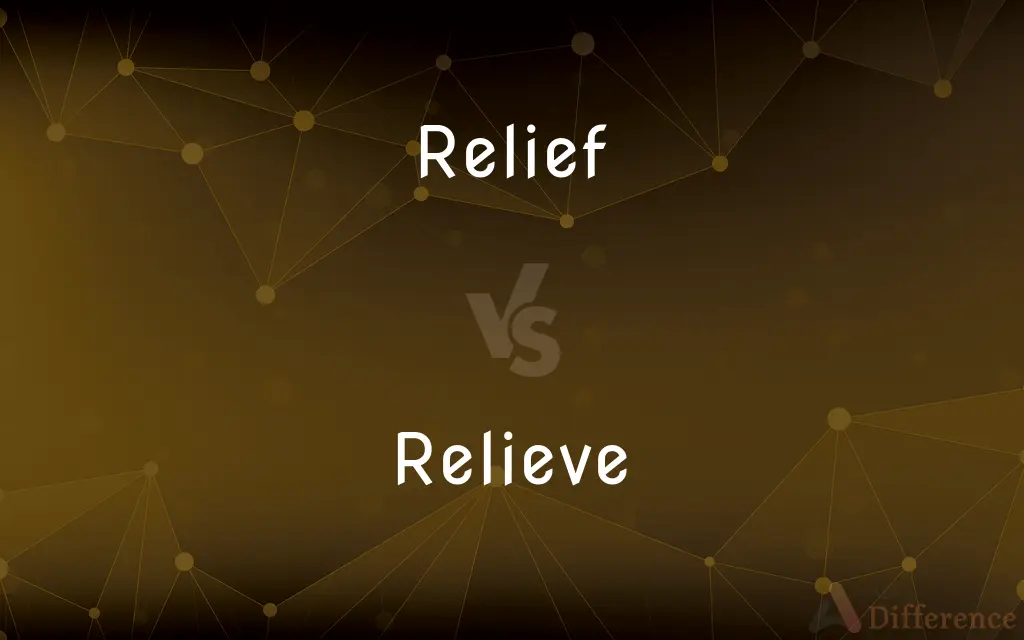Relief vs. Relieve — What's the Difference?
By Tayyaba Rehman — Updated on November 7, 2023
"Relief" is a noun meaning the alleviation of pain, distress, or anxiety; "relieve" is a verb meaning to cause relief.

Difference Between Relief and Relieve
Table of Contents
ADVERTISEMENT
Key Differences
"Relief" and "Relieve" are terms intricately connected, yet distinct in their grammatical roles and connotations. Relief, a noun, signifies the state of being eased from distress or discomfort, akin to the lightening of a burden. It embodies the result, the end of suffering or the provision of aid. Think of relief as the destination reached after a long journey. In contrast, relieve, a verb, is the action of alleviating pain or distress, like the hands that remove the weight from one's shoulders. It is the process, the act of providing relief, and the steps taken towards achieving that state of ease.
Relief is the noun form of the concept, the sensation experienced when stress is alleviated. It's the emotion you feel when a burden has been lifted, comparable to the calm after a storm. As a noun, it captures the essence of reprieve and comfort received after a period of difficulty. Relieve, on the other hand, is the verb, the action taken to produce the state of relief. It's the act of easing the burden, like the act of calming the storm itself. This verb form is dynamic, representing the intervention that brings about the state of relief.
In discussing relief and relieve, it is crucial to understand their syntactical functions. Relief serves as a subject or object within a sentence, often accompanied by articles and modifiers, such as in "a sense of relief." It plays a static role, depicting a condition or a consequence. Relieve, conversely, is a verb that necessitates a subject to perform the action and often an object to receive it, as in "to relieve someone's pain." It is transactional, involving a giver and a receiver of the action.
When examining the etymology, both relief and relieve share the same roots, stemming from the Latin 'relevare,' meaning to lift up or lighten. Yet, their usage in language has evolved to signify different aspects of alleviation. Relief has become the term for the experience of having been alleviated, often used in medical, emotional, and humanitarian contexts. Relieve, as a verb, conveys the act of providing aid or comfort, a function that inherently implies motion or change, such as in medical treatment or emotional support.
Comparison Chart
Part of Speech
Noun – names a state or feeling of having pressure or burden removed.
Verb – describes the action of removing or lessening a burden or distress.
ADVERTISEMENT
Function in Sentence
Subject or object – "The relief from pain was immediate."
Action – "Medicine can relieve pain."
Tenses
Not applicable – nouns do not have tenses.
Can be modified to indicate tense – "She will relieve the guard at midnight."
Form Variations
Can have plural form – "Disasters require urgent reliefs."
Can be modified to indicate voice, mood, etc. – "He is relieved by the news."
Usage
Used to express the outcome – "The donation brought relief to the community."
Used to express the process – "This cream relieves itching."
Compare with Definitions
Relief
The removal or alleviation of pain, distress, or anxiety.
After the exam, I felt a huge sense of relief.
Relieve
To ease or alleviate (pain, distress, anxiety, need, etc.).
The medicine did nothing to relieve my headache.
Relief
The difference in elevation and topography in a landscape.
The relief of the mountainous region was striking.
Relieve
To cause a lessening or alleviation of
Relieved all his symptoms.
Relieved the tension.
Relief
Release from duty or responsibility.
She sighed in relief when her replacement arrived.
Relieve
To make less tedious, monotonous, or unpleasant
Only one small candle relieved the gloom.
Relief
Relief is a sculptural technique where the sculpted elements remain attached to a solid background of the same material. The term relief is from the Latin verb relevo, to raise.
Relieve
To free from pain, anxiety, or distress
I was relieved by the news that they had arrived home safely.
Relief
The easing of a pain, distress, or anxiety
The drug provides quick relief from asthma. The news of their safe arrival came as a great relief.
Relieve
To furnish assistance or aid to
Relieve the flooded region.
Relief
Something that alleviates pain, distress, or anxiety
It was a relief to see that everyone had arrived safely.
Relieve
To rescue from siege.
Relief
Aid in time of danger
Disaster relief.
Relieve
To release (a person) from an obligation, restriction, or burden.
Relief
Rescue from a siege
Troops sent for the relief of the fort.
Relieve
To free from a specified duty by providing or acting as a substitute.
Relief
Public assistance
People eligible for relief.
Relieve
(Baseball) To enter the game as a relief pitcher after (another pitcher).
Relief
Release from a post or duty, such as that of sentinel.
Relieve
(Informal) To rob or deprive
Pickpockets relieved him of his money.
Relief
One who takes over a post or duty for another.
Relieve
(Archaic) To make prominent or effective by contrast; set off.
Relief
Something that makes a pleasant or amusing change from something tedious or unpleasant
The music was a great relief after all those phone calls.
Relieve
(transitive) To ease (a person, person's thoughts etc.) from mental distress; to stop (someone) feeling anxious or worried, to alleviate the distress of.
I was greatly relieved by the jury's verdict.
Relief
The projection of figures or forms from a flat background, as in sculpture, or the apparent projection of such shapes in a painting or drawing.
Relieve
(transitive) To ease (someone, a part of the body etc.) or give relief from physical pain or discomfort.
Relief
A work of art featuring such projection. Also called relievo.
Relieve
(transitive) To alleviate (pain, distress, mental discomfort etc.).
Relief
(Geology) The variations in elevation of an area of the earth's surface.
Relieve
(transitive) To provide comfort or assistance to (someone in need, especially in poverty).
Relief
Distinction or prominence due to contrast
"The light brought the white church ... into relief from the flat ledges" (Willa Cather).
Relieve
(obsolete) To lift up; to raise again.
Relief
(Law) The objective sought by a lawsuit or legal action, such as an award of monetary damages or an order requiring the other party to take a particular action.
Relieve
To raise (someone) out of danger or from (a specified difficulty etc.).
Relief
(Baseball) The pitching done by a relief pitcher
Gave the team two innings of excellent relief.
Relieve
(legal) To free (someone) from debt or legal obligations; to give legal relief to.
This shall not relieve either Party of any obligations.
Relief
A payment made by the heir of a deceased tenant to a feudal lord for the privilege of succeeding to the tenant's estate.
Relieve
(transitive) To bring military help to (a besieged town); to lift the siege on.
Relief
The removal of stress or discomfort.
I sighed with relief when I found out that my daughter hadn't got lost, but was waiting for me at home.
Relieve
To release (someone) from or of a difficulty, unwanted task, responsibility etc.
Relief
The feeling associated with the removal of stress or discomfort.
Relieve
To free (someone) from their post, task etc. by taking their place.
Relief
Release from a post or duty, as when replaced by another.
Relieve
To make (something) stand out; to make prominent, bring into relief.
Relief
The person who takes over a shift for another.
Officer Schmidt can finally go home because his relief has arrived.
Relieve
To urinate or defecate.
Relief
Aid or assistance offered in time of need.
Relieve
To ease one's own desire to orgasm, often through masturbation to orgasm.
Relief
(legal) Court-ordered compensation, aid, or protection, a redress.
Relieve
To lift up; to raise again, as one who has fallen; to cause to rise.
Relief
A lowering of a tax through special provisions; tax relief.
Relieve
To cause to seem to rise; to put in relief; to give prominence or conspicuousness to; to set off by contrast.
Her tall figure relieved against the blue sky; seemed almost of supernatural height.
Relief
A certain fine or composition paid by the heir of a tenant upon the death of the ancestor.
Relieve
To raise up something in; to introduce a contrast or variety into; to remove the monotony or sameness of.
The poet must . . . sometimes relieve the subject with a moral reflection.
Relief
A type of sculpture or other artwork in which shapes or figures protrude from a flat background.
Relieve
To raise or remove, as anything which depresses, weighs down, or crushes; to render less burdensome or afflicting; to alleviate; to abate; to mitigate; to lessen; as, to relieve pain; to relieve the wants of the poor.
Relief
The apparent difference in elevation in the surface of a painting or drawing made noticeable by a variation in light or color.
Relieve
To free, wholly or partly, from any burden, trial, evil, distress, or the like; to give ease, comfort, or consolation to; to give aid, help, or succor to; to support, strengthen, or deliver; as, to relieve a besieged town.
Now lend assistance and relieve the poor.
Relief
The difference of elevations on a surface.
The relief on that part of the Earth's surface
Relieve
To release from a post, station, or duty; to put another in place of, or to take the place of, in the bearing of any burden, or discharge of any duty.
Who hath relieved you?
Relief
(heraldry) The supposed projection of a charge from the surface of a field, indicated by shading on the sinister and lower sides.
Relieve
To ease of any imposition, burden, wrong, or oppression, by judicial or legislative interposition, as by the removal of a grievance, by indemnification for losses, or the like; to right.
Relief
(of a surface) Characterized by surface inequalities.
Relieve
Provide physical relief, as from pain;
This pill will relieve your headaches
Relief
Of or used in letterpress.
Relieve
Free someone temporarily from his or her obligations
Relief
The act of relieving, or the state of being relieved; the removal, or partial removal, of any evil, or of anything oppressive or burdensome, by which some ease is obtained; succor; alleviation; comfort; ease; redress.
He sees the dire contagion spread so fast,That, where it seizes, all relief is vain.
Relieve
Grant relief or an exemption from a rule or requirement to;
She exempted me from the exam
Relief
Release from a post, or from the performance of duty, by the intervention of others, by discharge, or by relay; as, a relief of a sentry.
For this relief much thanks; 'tis bitter cold.
Relieve
Lessen the intensity of or calm;
The news eased my conscience
Still the fears
Relief
That which removes or lessens evil, pain, discomfort, uneasiness, etc.; that which gives succor, aid, or comfort; also, the person who relieves from performance of duty by taking the place of another; a relay.
Relieve
Save from ruin, destruction, or harm
Relief
A fine or composition which the heir of a deceased tenant paid to the lord for the privilege of taking up the estate, which, on strict feudal principles, had lapsed or fallen to the lord on the death of the tenant.
Relieve
Relieve oneself of troubling information
Relief
The projection of a figure above the ground or plane on which it is formed.
Relieve
Alleviate or remove;
Relieve the pressure and the stress
Relief
The appearance of projection given by shading, shadow, etc., to any figure.
Relieve
Provide relief for;
Remedy his illness
Relief
The height to which works are raised above the bottom of the ditch.
Relieve
Free from a burden, evil, or distress
Relief
The elevations and surface undulations of a country.
Relieve
Take by stealing;
The thief relieved me of $100
Relief
The feeling that comes when something burdensome is removed or reduced;
As he heard the news he was suddenly flooded with relief
Relieve
Grant exemption or release to;
Please excuse me from this class
Relief
The condition of being comfortable or relieved (especially after being relieved of distress);
He enjoyed his relief from responsibility
Getting it off his conscience gave him some ease
Relieve
To free from a burden, evil, or distress.
The fund was set up to relieve famine.
Relief
(law) redress awarded by a court;
Was the relief supposed to be protection from future harm or compensation for past injury?
Relieve
To release someone from duty by taking their place.
I came to relieve the guard at his post.
Relief
Someone who takes the place of another (as when things get dangerous or difficult);
The star had a stand-in for dangerous scenes
We need extra employees for summer fill-ins
Relieve
To bring to a less dense or crowded state.
Opening a new lane on the highway should relieve traffic congestion.
Relief
Assistance in time of difficulty;
The contributions provided some relief for the victims
Relieve
To provide a pleasing contrast or variation.
The comedian's humor relieved the tension in the room.
Relief
A pause for relaxation;
People actually accomplish more when they take time for short rests
Relief
A change for the better
Relief
Aid for the aged or indigent or handicapped;
He has been on relief for many years
Relief
The act of reducing something unpleasant (as pain or annoyance);
He asked the nurse for relief from the constant pain
Relief
Sculpture consisting of shapes carved on a surface so as to stand out from the surrounding background
Relief
The act of freeing a city or town that has been besieged;
He asked for troops for the relief of Atlanta
Relief
Aid or assistance offered in times of hardship.
The relief efforts after the hurricane were commendable.
Relief
A feeling of reassurance and relaxation following worry.
His kind words gave me some relief.
Common Curiosities
Is relief a verb or a noun?
Relief is a noun.
What is the adjective form of relief?
The adjective form is "relieved."
How do you use relieve in a sentence?
"The cool breeze helped to relieve the heat."
What is a synonym for relieve?
Alleviate.
Can relief be used to refer to financial aid?
Yes, it can refer to financial assistance.
Can relieve be used in an emotional context?
Yes, it can refer to alleviating emotional distress.
Can relieve be used as a noun?
No, relieve is a verb.
Does relief have a plural form?
Yes, the plural form is "reliefs."
Can relief be used in a physical sense?
Yes, it often refers to physical alleviation of pain or distress.
What part of speech is relief?
Relief is a noun.
Is there a phrase that combines both relief and relieve?
Yes, "relief efforts" often imply actions to relieve suffering.
Can you use relieve in the past tense?
Yes, as in "relieved."
Does relief only pertain to positive outcomes?
Typically, yes, as it implies the end of discomfort.
Is relieve always immediate?
Not necessarily, it can be a process over time.
Can relief be used in a topographical context?
Yes, it can describe the physical contours of a landscape.
Share Your Discovery

Previous Comparison
Claimant vs. Plaintiff
Next Comparison
Tapped vs. TapedAuthor Spotlight
Written by
Tayyaba RehmanTayyaba Rehman is a distinguished writer, currently serving as a primary contributor to askdifference.com. As a researcher in semantics and etymology, Tayyaba's passion for the complexity of languages and their distinctions has found a perfect home on the platform. Tayyaba delves into the intricacies of language, distinguishing between commonly confused words and phrases, thereby providing clarity for readers worldwide.













































